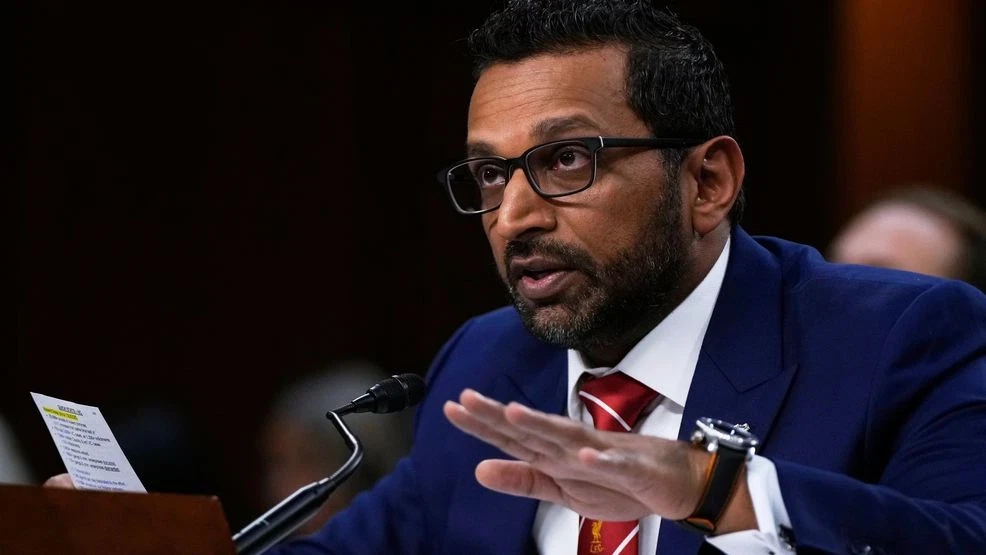





















.webp&w=256&q=75)



.webp&w=256&q=75)



Loading banners
Loading banners...


NEWS EXPRESS is Nigeria’s leading online newspaper. Published by Africa’s international award-winning journalist, Mr. Isaac Umunna, NEWS EXPRESS is Nigeria’s first truly professional online daily newspaper. It is published from Lagos, Nigeria’s economic and media hub, and has a provision for occasional special print editions. Thanks to our vast network of sources and dedicated team of professional journalists and contributors spread across Nigeria and overseas, NEWS EXPRESS has become synonymous with newsbreaks and exclusive stories from around the world.

WHO logo
The withdrawal of the United States from the World Health Organization (WHO) could have significant implications for Nigeria and global health as America plays a critical role in funding, shaping health policies and providing responses to global health crises, according to public health experts.
They noted that the withdrawal also poses significant implications for Nigeria, as the country heavily relies on the WHO support for its public health system and initiatives, disease control efforts, and access to essential health services.
Donald Trump, the newly inaugurated president of the US, announced on Monday that he is withdrawing the US from the global health body, citing the WHO?s mishandling of the COVID-19 pandemic that arose out of Wuhan, China, and other global health crises.
The WHO has expressed regrets over the withdrawal announcement by the United States of America and urged the country to reconsider the decision.
The BMJ, a journal, in its publication on Tuesday following the announcement, warned that the severing of ties between the world?s largest economy and its foremost public health body represents a major setback for health diplomacy, scientific collaboration, and funding. The repercussions, it noted, will ripple across borders, including Nigeria, and leave WHO weaker.
Here are some potential effects of the withdrawal on Nigeria and global health.
Reduced funding
The global health body relies heavily on US funding, which contributes about 18 percent of its budget. The agency?s two-year budget for 2024-2025 was $6.8 billion. In that period, the US financed 75 percent of WHO?s programmes for HIV and other sexually transmitted diseases and over half of contributions to combat tuberculosis.
There are concerns that a withdrawal could lead to a significant financial shortfall for the organisation, potentially impacting its ability to fund health programmes, respond to outbreaks, and provide support to low- and middle-income countries like Nigeria, which might see a reduction in WHO funding for various WHO-supported health programmes, including disease control efforts, vaccination campaigns, and health system strengthening initiatives.
The WHO is one of the biggest donor agencies and health financiers in Nigeria.
For instance, the health body approved $5.84 billion for Nigeria in 2020-2021 alone. According to health experts, this potential decline in funding for a country that still commits a meagre percentage of its budget to health could exacerbate health challenges.
Adaobi Onyechi, a health expert, said decreased funding could place additional strain on an already stretched health budget and increase disease burdens in areas where WHO is intervening.
The WHO provides health interventions in Nigeria to address a range of health issues, including disease control, outbreak prevention, and mental health services. The WHO also works to improve health systems and human resources.
Onyechi, however, said the reduced funding also presents an opportunity for Nigeria to ramp up domestic financing and explore alternative sources of revenue, which she noted would not only improve health outcomes but boost the economy.
US withdrawal could disproportionately impact lower-income countries that rely on WHO support for vaccines, according to global health experts.
Nigeria is reliant on the WHO?s vaccine procurement and distribution programmes. Consequently, a reduction in the WHO?s capacity due to the US withdrawal could lead to decreased access to vaccines for Nigeria, potentially exacerbating outbreaks of vaccine-preventable diseases.
For instance, data from the WHO website shows that the agency played a role in ensuring COVID-19 vaccine equity for Nigeria, primarily through its involvement in the COVAX facility and other supportive initiatives.
There are concerns that the withdrawal could affect countries that rely on the WHO support for health systems strengthening, disease surveillance, and essential health services, potentially exacerbating health inequities. The US contributes scientific expertise and innovation to the WHO-led initiatives.
The WHO plays a key role in global health security, including the surveillance of diseases and coordination during outbreaks and providing technical and scientific support.
Health experts warn that Nigeria may navigate a more fragmented global health landscape, seeking bilateral partnerships or support from alternative international organisations. A fragmented response increases the risk of uncontrolled disease outbreaks, threatening international health security.
There are growing concerns that other countries, such as China, may step in to fill the void left by the US, potentially reshaping the priorities and governance of global health initiatives.
Currently, the WHO plays a central role in coordinating responses to global health emergencies. Experts believe that the reduced funding for WHO could affect the extent to which the global body provides support, which Nigeria and several other countries have relied on for decades.
Nigeria relies on the WHO for technical assistance in disease surveillance, outbreak detection, and response. The WHO recommendations also shape local response as seen in COVID-19 and ongoing Mpox outbreaks. Consequently, experts believe that a reduced WHO presence could lead to a decrease in Nigeria?s capacity to detect and respond to outbreaks, potentially putting the public?s health at greater risk.
Impact on health diplomacy
Public health experts believe that health issues often transcend borders, and global cooperation is essential for effectively managing health challenges, noting that a US withdrawal could undermine international collaboration, making it more difficult to coordinate efforts on diseases that require a unified global response.
The WHO?s leadership in global health provides a platform for Nigeria to engage with other countries, international organisations, and donors. According to experts, the withdrawal could limit Nigeria?s access to international partnerships and resources, making it more challenging to secure funding and technical support for its health programmes. (BusinessDay)